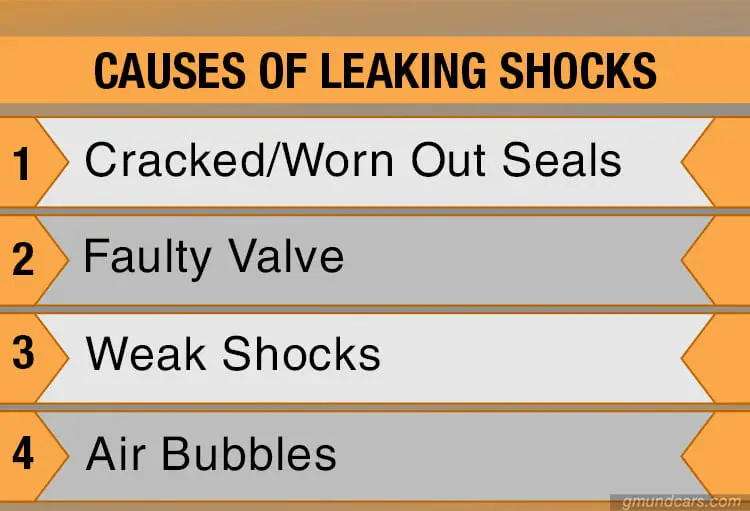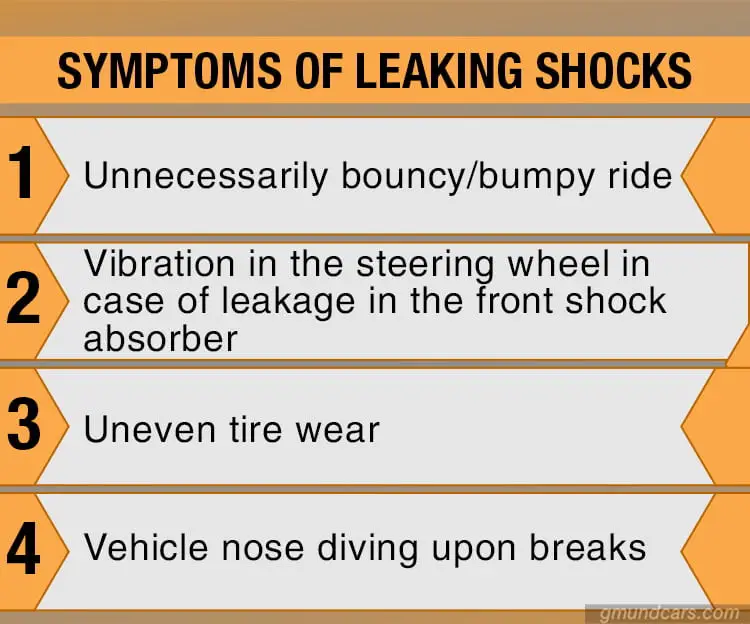Shock absorbers play a vital role in a car’s suspension system by ensuring a smooth ride. Without these components, your vehicle would lose its stability every time you ride over a speed bump or pothole.
Need tools for your project? Toolbox, a tool rental marketplace, might be worth a look.
Therefore, leaking shock absorbers can cause damage to your car and threaten your safety. The whole balance of the car depends on the condition of the shock absorbers every time it goes over a bump or pothole. If this vital component is malfunctioning, it puts you and the vehicle at risk.
Let’s see how the leaking shocks can occur, what are the symptoms, and what you can do about it!
Why Are Your Shocks Leaking?
There is more than just one reason for a leaking shock absorber. Let’s see how and why each comes about:

Cracked/Worn Out Seals
Old shocks can have worn out or broken seals which can lead to excessive fluid leakage. This especially happens when you go over bumps. Cracked or worn-out seals become a problem when the shocks are too old. Make sure you get the shocks checked to see if it’s time for a replacement.
Faulty Valve
A faulty valve can cause leakage in shock absorbers as well. This happens when liquid flows through both sides of the shock due to a faulty valve on just one side. When the pressure levels in the reservoir fall down, and the car is put through high-speed corner maneuvers.
Weak Shocks
Another cause of leaking shock absorbers is weak shocks. When the shocks aren’t as strong as they used to be due to wear and tear, they can cause the springs to go out of their place, causing leakage. Similarly, if the shocks are too stiff, they can cause excessive fluid movement back upon compression. In either case, you will have a leaking shock absorber that might need repair or replacement.
Air Bubbles
When the oil/fluid in the shock absorbers has aged or been stored for a while, air bubbles form up. The bubbles lead to pressure formation, which forces the fluid past the seals. This leakage can happen from the piston rod pins or even bearings. Make sure to inspect the oil levels and maintain them as time passes by.
What Are Leaking Shock Absorber Symptoms?
Being a vehicle owner, you must be wondering how to tell if a shock absorber is leaking. There are several symptoms that can occur individually or together. If you are experiencing any of the following, chances are you have leakage in the shock absorbers:

- Unnecessarily bouncy/bumpy ride
- Vibration in the steering wheel in case of leakage in the front shock absorber
- Uneven tire wear
- Vehicle nose diving upon breaks
However, experiencing these symptoms doesn’t necessarily mean that the problem is in the shock absorbers. All of these symptoms are also signs of poor alignment or other mechanical problems. Make sure to refer to a professional mechanic if you experience any of the symptoms. You might end up saving on shock replacement with a less costly alignment.
Is It Safe To Drive A Car With A Leaking Shock Absorber?
The simple answer is no, but let’s understand why. Shock absorbers are a vital component of any vehicle. They are meant to provide you with a smooth ride. As a result, you might be under the impression that a faulty shock absorber will only take the smoothness away and pose no threat to your safety.
However, it is actually quite dangerous to drive a car with a leaking shock absorber. A small bump can throw the ride out of balance, making you lose control of the car. More importantly, going over potholes, speed bumps, or railroad trails can become reasons for car accidents.
Therefore, if you have a leaking shock absorber, either get it repaired or replaced. Don’t wait before it gets worse because it’s a threat to your safety as well as the vehicle. More importantly, faulty shocks can also cause irreparable and excessive damage to the tires. This leads to a much costlier repair job as tires are a big investment.
Can You Repair A Leaking Shock Absorber?
If you are visually inspecting a shock absorber, then oil on the ground, absorber body, or nearby components indicates a leak. You cannot tell from just looking whether it is a broken seal or torn-out shock body or if it’s due to any other reason.
Whether a leaking shock absorber can be repaired or not depends on the cause of the leak. Broken seals can be replaced. However, they won’t last long if the shock itself is aged and weak. Only a professional mechanic can tell you whether the repair is possible and feasible.
How To Fix Leaking Shock Absorber
The first step to fixing a leaking shock absorber is to check the fluid level in the reservoir. If the fluid level is down, add more and check again. Hopefully, the issue will be resolved. If not, then move on to removing the four bolts that attach the car to the shock.
Make sure to keep the bolts somewhere safe, so you don’t lose them. Now take off the top of the shock absorber carefully without letting any parts fall out. Once done, it is time to remove the old, damaged seal with a new one. Replace all the bolts in the right place tightly and see if the issue is resolved.
If you are still facing the same issue, it is time to replace the shock absorber. You can also do a replacement on your own at home. However, before doing so, make sure to get professional advice on the condition of the current shocks. Replacing the shock absorber is the most common solution to a leak. However, if a repair can fix it, then you should save the extra amount.
Conclusion
To conclude, whether you are okay with a few bumps here and there, getting shock absorber replacement or repair is a must if there is a leakage. Do not neglect the poorly performing shocks because the longer they are made to work when not perfect, the more damage they cause. More importantly, the threat to your safety increases as you continue on driving with a leaking shock absorber.